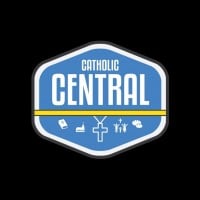
[caption id="attachment_127510" align="aligncenter" width="800"] Catholic Central hosts Kaiser Johnson and Libby Slater. Copyright 2017 Family Theater Productions. Used with permission. All rights reserved.[/caption]
Catholic Central hosts Kaiser Johnson and Libby Slater. Copyright 2017 Family Theater Productions. Used with permission. All rights reserved.[/caption]
As He always should, God takes center stage this week on “Catholic Central.” We look at turning points in His Church, the people who spoke for Him, who exactly He is, how He asks us to live our lives, and finally, how we can convince others of His existence. That’s a lot for young minds to take in, but we do it clearly, concisely and with lots of humor (and CatholicCentral.com is there for you with downloadable resources and links).
[caption id="attachment_172272" align="aligncenter" width="477"] Copyright 2020 Catholic Central/Family Theater Productions. All rights reserved.[/caption]
Copyright 2020 Catholic Central/Family Theater Productions. All rights reserved.[/caption]
What Can You Learn About the History of the Church in 5 Moments?
History is made up of millions of small moments and individual decisions, but looking back, specific turning points can be identified.
The Catholic Church has seen a lot in its 2,000+-year history. In “Catholic Central: Church History in 5 Moments,” Kai and Libby look at 5 key moments in history that helped shape the Church into what it is today.
https://www.youtube.com/watch?v=RAw5FBK08Ug&t=2s
[tweet "Kai and Libby of @CatholicC_TV look at 5 key moments in history that helped shape the Church into what it is today."]
Diving Deeper
- Can you change but still stay the same? As the Body of Christ on Earth, how has the Church’s ability to “change but still same the same” helped her to respond to the changing needs of humanity through the last two millennia?
- How do Scripture, Tradition, and reason work together to help the Catholic Church address contemporary issues and stay close to her mission? What might happen to the Church’s decision-making ability if she were missing Tradition (wisdom from history, guided by the Holy Spirit, a living chain stretching back to Jesus)? What might happen to the Church’s decision-making ability if she were missing reason (a God-given ability to use our minds to make logical sense of the world around us)?
- What are some new issues in our time to which the Church might need to respond?
Activity
Research a saint or Catholic leader from a moment of great change in the Church: Post-Resurrection (33 A.D. - 350 A.D.), Post-Constantine (313 A.D. - 1400 A.D.), Post-Reformation (1519 A.D. - 1700 A.D.), Post-Enlightenment (1620 A.D. - 1815 A.D.), or The Contemporary Church (1959 A.D. - Today). What was their motivation? How did they move the Church closer to her mission? How were they perceived by others at the time of their work? How are they seen today? What can we learn from their work in the Church and in the world?
Reflection by Father Vince Kuna, C.S.C.
Both saints and sinners mark the Catholic Church, now well into its third millennium. St. Paul wrote in his second letter to the community in Corinth (4:7) that the Church holds these truth in “earthen vessels,” stating God’s truth is mediated through fallen humanity, that is, however depraved the personal sins of some clerics who proclaim the Gospel message, the Gospel nevertheless remains true. Meditate upon this passage. Take solace in the passage that if and when another Church scandal should break, the sins in and of themselves do not invalidate God’s saving truth.
Copyright 2020 Family Theater Productions
About the Author

Catholic Central
“Catholic Central” hosts Kai and Libby take their Catholic faith seriously but not themselves, entertaining and informing viewers on Church history and doctrine. Fun and fact-filled, Gabriel Award-winning episodes address a wide range of topics and questions. We want to be central to your faith. Watch, laugh and learn!


.png?width=1806&height=731&name=CatholicMom_hcfm_logo1_pos_871c_2728c%20(002).png)
Comments